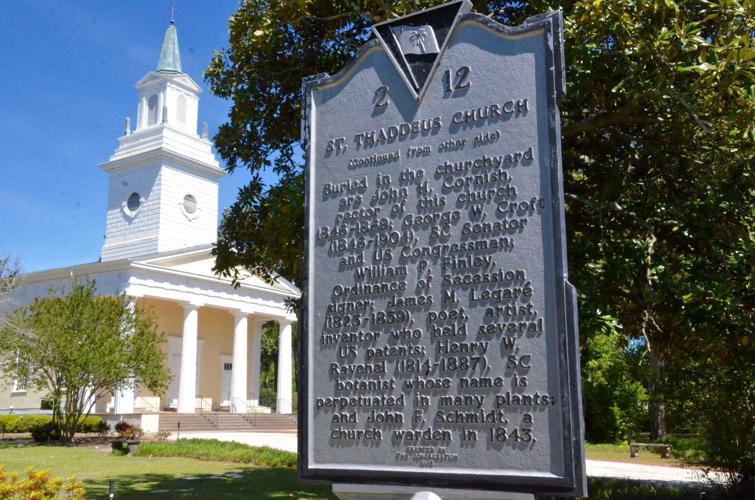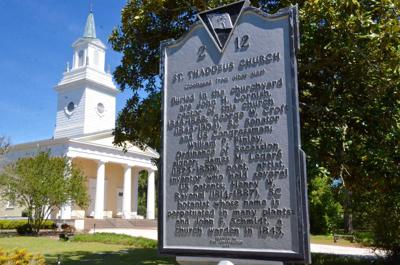Long before its founding in 1871, Aiken County has been a community of faith.
Its many churches and religious organizations are intertwined with the county’s and its communities’ histories, dating to before the American Revolution.
Silver Bluff Missionary Baptist Church
One of the most historic churches not only in Aiken County or South Carolina but the United States is in Beech Island in southwest Aiken County.
Started possibly as early as the 1750s and organized around 1775, Silver Bluff Missionary Baptist Church is one of the oldest independent African American Christian congregations in America, according to the website scencyclopedia.org.
The Indian trader and planter George Galphin, an Irish immigrant, played an important part in the development of the church because he permitted Black and white preachers to minister on his plantation on the banks of the Savannah River.
Galphin was unusual, allowing his slaves to worship independently without his oversight, according to the website scpictureprojet.org. Under the leadership of David George, an enslaved African American, these men and women formed the early foundations of Silver Bluff Missionary Baptist Church. The first congregation is believed to have been Presbyterian through the influence of Galphin and his Irish heritage. The church later practiced Methodism before finally becoming Baptist in 1773.
The church is at 360 Old Jackson Highway, Jackson.

St. Thaddeus Episcopal Church
St. Thaddeus Episcopal Church
Its cornerstone laid in 1842 just seven years after the founding of Aiken, St. Thaddeus Episcopal Church on Pendleton Street is tied closely to the city’s history, especially the city’s early connection to the railroad.
A planned town, Aiken was laid out in the 1830s by the South Carolina Canal and Railroad Company. The plan reserved land for churches, one of which was St. Thaddeus, according to the church’s website.
Throughout the 19th century, the church had few resident communicants, but Charlestonians who fled the coast for Aiken to escape epidemics of yellow fever maintained the church.
But as the city of Aiken grew and new visitors from the North who fled the harsh winters of the Northeast and Midwest and created the Winter Colony arrived, St. Thaddeus grew, too.
St. Thaddeus experienced its greatest growth since 1950, when the then-Savannah River Plant was built in southwest Aiken County and brought thousands of new residents to support America’s nuclear weapons programs.
Today, St. Thaddeus is a large parish, according to its website, that provides outreach programs to its parishioners and the community, including a soup kitchen every Saturday that serves about 100 hot lunches every week.

Adath Yeshurun, Aiken's synagogue, was established in 1921 and is at Greenville Street and Barnwell Avenue. (Bill Bengtson/Staff)
Adath Yeshurun Synagogue
During the late 19th century, Jewish immigrants, many of them from Eastern Europe, found new homes in Aiken and became leaders in business, politics and civic affairs.
By 1890, the Jewish community in the city was well-established, and its members held services in private homes or buildings, including the Masonic Hall. As the population grew, the congregation needed its own synagogue.
In 1921, the group received its charter as Adath Yeshurun Congregation, which means Congregation of Israel. Meyer Harris, J.S. Poliakoff, M. Poliakoff, B.M. Surasky and Jacob Wolf represented its members, according to a historical marker, erected in 2014, outside the synagogue on Pendleton Street.
The synagogue, built in the classical revival style, was completed in 1925, according to the synagogue’s website. Since its construction, the synagogue has been in continuous use both as a house of worship and a community center for Aiken’s Jewish residents.

Our Lady of the Valley Catholic Center, in Gloverville, is among dozens or possibly hundreds of Aiken County religious organizations dealing with massive scheduling and program changes this month, in the midst of the coronavirus outbreak.
Our Lady of the Valley Catholic Church
Our Lady of the Valley Catholic Church on Augusta Road in Gloverville has been committed to serving its community’s spiritual and physical needs for almost a century.
In the 1930s, Msgr. George L. Smith, the pastor of St. Mary Help of Christians Catholic Church in Aiken, enlisted the aid of wealthy residents to build a mission center in the neighboring Horse Creek Valley, which stretches southwest of the city toward North Augusta.
In 1939, the Horse Creek Valley Handicraft and Welfare Center, later known as Our Lady of the Valley Catholic Center, became the first social service agency in the Horse Creek Valley. During the Great Depression, the Valley, made up then of several unincorporated textile mill towns, was said to the be the second largest pocket of poverty in the United States, according to the center’s website.
The center was staffed by Sisters of Christian Doctrine, who taught kindergarten, visited homes to care for the sick and formed groups to provide service and recreational programs for all ages.
In 1941, the center established a rural, multipurpose community center to minister to the needs of Horse Creek Valley residents without regard to religious belief, age, race, sex, national origin or disability.
Today, the center’s mission continues by identifying and responding to the unmet needs of Horse Creek Valley residents in the name of Jesus Christ. Through its ministry, directed by Catholic Charities of South Carolina, the center provides educational training, financial assistance and emergency food through its food pantry.







